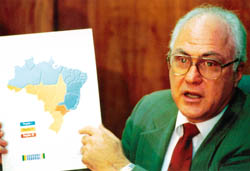Harmonizing idealism with solvency
The basic challenge of the modern
telecommunication regulator

The telecommunication sector witnessed an unprecedented growth rate during
the last decade. In some countries such as Brazil, network expansion in
the last three years alone has surpassed the plant that had been in place
until 1998
|
Luíz Francisco Perrone
Member of the Board of Directors
Agencia Nacional de Telecomunicações (ANATEL)
Brazil
The role of telecommunications in modern society
The telecommunication sector witnessed
an unprecedented growth rate during the last decade. In some countries such as
Brazil, network expansion in the last three years alone (1999, 2000 and
2001) has surpassed the plant that had been in place until 1998. In other words,
in literally three years, the Brazilian society was offered far more services
than all services ever provided since the start of telecommunications more than
a century ago.
This growth, if considered at its face value, is formidable.
But much more than the quantity of services available is their improved quality
and their distribution among the less favoured members of society.
Telecommunications is no longer a second-class actor in the
global development of a country. It is an indispensable tool for economic growth
and better distribution of wealth. This democratization of wealth is a factor
that has become more evident as information has become more and more valuable
and as the telecommunication network itself has come to transport information.
Unlike material goods, information can be shared, distributed, stored, processed
and reused without losing its original value. These characteristics highlight
the importance of telecommunications as the tool that can transport and
distribute information at low cost. Furthermore, telecommunications is,
naturally, a non-polluting, employment-generating industry.
From all of these factors, the level of priority that many
countries attach to this “politically correct” sector today should not be
surprising.
Regulatory agencies and the role of the regulator
In this environment of explosive
growth, responsible governments cannot disregard telecommunication penetration
(teledensity). Rather, they should ensure that the offer of telecommunication
services is widespread and available to all classes of the population,
irrespective of their purchasing power, economic activity or geographic
location. This preoccupation is generally known as universal access to
telecommunications.
 Universal access and competition should be the pillars upon
which each country should build its telecommunication model, stimulating infrastructure
development and the use of new technologies Universal access and competition should be the pillars upon
which each country should build its telecommunication model, stimulating infrastructure
development and the use of new technologies
Photo: PhotoDisc (ITU 020028)
|
At the same time, services built on the latest technology
must be of high quality and must be offered at a fair cost to users. In order to
achieve such conditions, there must be stimulation to provide services under a
competitive environment.
Universal access and competition should be the pillars upon
which each country should build its telecommunication model, stimulating
infrastructure development and the use of new technologies. This model is
normally developed by the regulatory agency taking into account the particular
characteristics of a country; and should be subject to congressional review.
Regulatory agencies are entities created with the basic
responsibilities of stimulating investments in telecommunications, protecting
the interests and rights of consumers and promoting fair competition among
service providers. Harmonizing idealism with solvency is a very difficult task.
What conditions are necessary for a regulatory agency to be
able to discharge its responsibilities? The first condition is the political
will of the highest authorities of the country. This political and unequivocal
determination, coupled with the characteristics listed below, constitute the
basic foundations of a successful regulatory agency.
-
Independence and authority: Regulatory
agencies should be seen as State entities, and need to keep administrative
continuity during governmental changes. They should also have the
power to implement their decisions, which, in principle, could only be
challenged in Court.
-
Transparency and public
information: Decisions and actions of
regulatory agencies should be published after a transparent
decision-making process. The intention of all decisions and actions should
be made clear.
-
Predictability:
There should be no surprises regarding actions and decisions. The model
for telecommunication exploitation should be clear, and decisions
should always conform to that model. The regulatory agency’s working plan
and schedule of main decisions should be made public.
-
Budgetary autonomy:
Agencies should operate with their own budget, which should be
adequate to cover their needs.
-
Capable and stable staff:
Employees of the agency should be selected from among capable individuals
and should work under stable conditions. The most senior officers should
have a fixed-term appointment and should not be removed from office for
political reasons.
Regulators should be fully aware of their responsibilities
and functions vis-à-vis the society. They should, for example:
-
Create and develop rules and procedures in conformity
with the telecommunication model adopted in their countries.
-
Authorize and license the provision of services in
accordance with those rules and procedures.
-
Protect the interests and rights of consumers,
preventing poor service quality and the abuse of economic power of
telecommunication operators.
-
Inspect service operations, taking the necessary
enforcement actions so that rules and regulations are followed.
-
Keep abreast of the main national policies that may
have implications for the agency’s activities and interact and work within
those policies.
 Telecommunications is no longer a second-class actor
in the global development of a country. It is an
indispensable tool for economic growth and better distribution of wealth Telecommunications is no longer a second-class actor
in the global development of a country. It is an
indispensable tool for economic growth and better distribution of wealth
Photo: A. de Ferron (ITU 005083)
|
Should there be more regulation or less regulation?
Should we regulate or deregulate?
The creation of an agency with its
rules and procedures might be perceived as “more regulation”, going
against the need to attract investments from telecommunication service
providers. Indeed, attracting investments might be easier when service providers
have more freedom and creativity.
This false paradox is based on the erroneous assumption that
deregulation means no regulation. But in actual fact, deregulation does not mean
that there is no regulation at all. Rather, it means reducing selectively the
fields and amount of State regulation on private economic activities —
widening private activities in a country’s economy.
In this sense, deregulation should evolve along two lines:
-
Firstly, an evolution in the sense of reducing “technical”
rules, with more concentration on the rules pertaining to the “rights of
consumers” and “competition”.
-
Secondly, an evolution in the sense of reducing those
rules as fair and healthy competition increases.
The future scenario of telecommunication regulation
If one wishes to imagine
telecommunications in the future, and the role of the regulatory agencies, a
simplified vision would lead to a scenario where services would converge
continuously (reducing the differences between them). And these services would
be available to all classes of consumers (democratization). Regulatory agencies
would have the function of ensuring that the services provided respect the
rights of consumers in a fair and competitive environment. We are working
towards this “telecommunication utopia”.
|